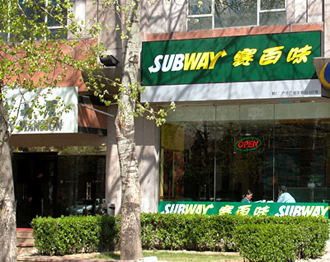Subway Leads China Fast-Food Growth
By wchung | 03 Apr, 2025
To meet its goal of doubling its China sales within five years, Subway plans to open 80 new stores in China by the end of the year to bring the total to 300.
“By the end of this year, we expect to have more than 90 stores in Beijing and nearly 300 in China,” said Alexander Moody-Stuart, Subway franchise’s general agent in Beijing. “By 2015 there will be 180 stores in Beijing and well over 600 stores in China.”
The company’s sales growth averaged 25% over the past five years, and topped 40% in 2010. Moody-Stuart expects to maintain that blistering pace over the next two years. The startling growth rate is par for the course for the maker of fast customized sandwiches that are popular with officer workers on short lunch breaks. By the end of 2010 Subway had raced past McDonald’s in total outlets worldwide, with 33,749 versus 32,737 for its older, better-established rival.
Subway opened its China franchising operation in 1995 with a few stores targeting mostly foreigners. Its growth began to surge in 2004 as it began catching on with Beijing office workers. Today the Subway store in Beijing’s Yinghua Dongjie neighborhood sells 200 sandwiches during Wednesday lunch due to a weekly “buy one, get one free” offer.
“People line up several meters outside the doors,” said staffer Luo Tian.
Because the chain’s sales are highest during lunchtime, most of Subway’s Beijing stores are located near office buildings though there are profitable locations in malls, outlet concessions, near universities, at travel depots and tourist spots like the Great Wall. The chain’s first drive-through location is now in the works.
Tuna is Subway’s most popular sandwich in China despite the chain’s continuing efforts to add local variations to the core menu. A sandwich chosen from the regular menu costs 30 yuan ($4.62) in China.
“The average selling price for each sandwich was a little over 19 yuan ($3.00) for March,” said Moody-Stuart. Fifteen yuan ($2.30) is considered an affordable price for a sandwich in Beijing.
“We are not competing to provide the cheapest food in Beijing,” said Moody-Stuart. The franchise has not raised its prices for more than two years and has plans to do so in the near future despite China’s current high inflation rate of around 5 percent.
A Subway franchise costs $9,000 in China, with a 50 percent discount for a second outlet. Subway takes an 8 percent cut of each store’s weekly sales and checks every store on a monthly basis to ensure prescribed standards are being maintained. The total cost of opening a Subway franchise in China, including the franchise fee, equipment and remodeling expenses, is around 750,000 yuan to 1 million yuan ($115,000 – $160,000), depending on location.
Subway has no plans to expand out beyond China’s 16 major cities because its cost structure would become prohibitive in smaller cities. But growth in China is essential to any global fast-food chain that hopes to enjoy robust growth.
YUM! Stores China, which owns more than 3,000 KFCs and 500 Pizza Huts, enjoyed $4.1 billion in sales in 2010, about 36.5 percent of the group’s total global sales.
“Fast food has become the first choice for 85 percent of Chinese city dwellers when they want to eat out,” said Bian Jiang, vice-general secretary of the China Cuisine Association, who is in charge of the organization’s fast food department.
China’s fast food market is about 540 billion yuan ($84 bil.) and has been growing at an 18 percent annual pace, said Bian.
“I believe the next five years will be a crucial time for China’s fast food industry because the urbanization progress is accelerating and more people have come to live in cities,” he said. “They are often in a hurry but demand good hygiene standards.”
Subway has become China's fastest-growing major fast-food chain.
Articles
Asian American Success Stories
- The 130 Most Inspiring Asian Americans of All Time
- 12 Most Brilliant Asian Americans
- Greatest Asian American War Heroes
- Asian American Digital Pioneers
- New Asian American Imagemakers
- Asian American Innovators
- The 20 Most Inspiring Asian Sports Stars
- 5 Most Daring Asian Americans
- Surprising Superstars
- TV’s Hottest Asians
- 100 Greatest Asian American Entrepreneurs
- Asian American Wonder Women
- Greatest Asian American Rags-to-Riches Stories
- Notable Asian American Professionals

